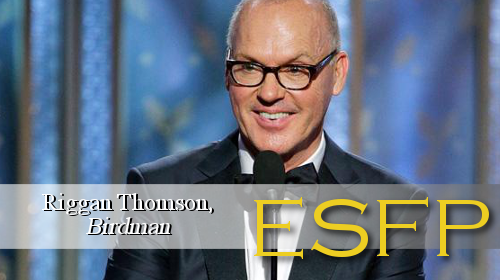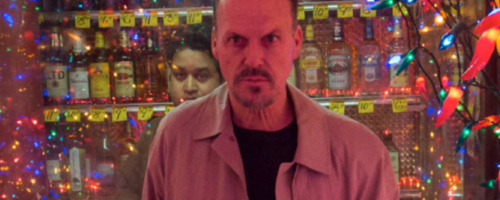2014 Golden Globe for Best Actor in a Musical or Comedy, nominee for the Academy Award for Best Actor, Michael Keaton
ESFP, the Performer, the Activator, the Challenger
Any study I write of a character is necessarily going to go from beginning to end of their story, but in this case I want to make sure I give an explicit SPOILER WARNING for Birdman: or The Unexpected Virtue of Ignorance. Go see this movie first before you read this. It’s just less than two hours, and moves forward with such intensity that it feels like barely an hour.
Dominant Function: Extraverted Sensing (Se), “Experience the Experience”
Riggan lives to perform, and needs to be out there on stage or in front of the camera doing something.
In his early years, Riggan played Birdman, a superhero in a series of blockbuster movies. Birdman offered an exciting, profitable opportunity at the time, and Riggan jumped on it, riding its success for years to become a world-famous movie star.
In his later years, Riggan is looking again for some level of celebrity and attention, to recreate his success. He wants to present an unforgettable experience to his audience, but this time through the spectacle and challenge of live theater.
When his first male co-star doesn’t work out, Riggan jumps at the chance to cast a big name stage actor who happens to be the boyfriend of one of the actresses in the show. Mike Shiner takes the job and immediately pushes Riggan’s buttons. The two share an emotional, improvised rehearsal scene that brings out new discoveries in their performances, and Riggan gets keyed-up and delighted by the stimulation. Their relationship grows tense as Shiner repeatedly steals the spotlight and the headlines, until Riggan tackles him backstage and punches him in the face.
As the production of the play gets more and more out of control, Riggan moves faster and louder. He barrels through the theater with panicked intensity, trying to keep things going through sheer force of will. He mortgages his house—which he was supposed to leave to his daughter—to pay for the show. He reprimands his daughter for smoking pot, and shortly afterward gets passed-out drunk. He apparently gets his younger girlfriend, whom he cast in the show, pregnant.
When his robe gets caught in a door on a smoke break, he pulls out of it and charges nearly naked through Times Square, hurrying back into the theater for his next scene, which he improvises in the moment thanks to his unexpected wardrobe change.
Desperate to do something that will capture his audience’s attention, Riggan takes a real gun on stage with him for his final scene and shoots himself in the head.
Auxiliary Function: Introverted Feeling (Fi), “Evaluate the Experience”
Riggan wants to excite his audience, but he also has deep, personal motivations for putting on his play. It’s adapted from a book that’s special to him, and the whole project is his baby. He wants to be considered a real actor, and constantly worries that his early life as a movie star marks him as a sell-out.
He spends a great deal of time brooding and meditating backstage, trying to find a sense of inner focus and calm, so that others don’t see how troubled he is.
Riggan has a high bullshit detector and gets rid of his original male co-star when he feels his performance is inauthentic. His insecurity flares in response to Mike’s criticism of his own inauthenticity, and to his daughter’s rant that he is expendable and unimportant. He takes it personally when a renowned theater critic threatens to destroy his show with her review, on the basis that she hates him for pretending to be an actor.
Riggan’s striving for authenticity—for a real moment—and his fear that his life is meaningless, fuels his impulsive decision to shoot himself in the head at the end of the show.
Tertiary Function: Extraverted Thinking (Te), “Organize the Experience”
In order to put on the show he wants, Riggan writes, directs, and stars in What We Talk About When We Talk About Love. He needs everything to go just so in order for it to meet his vision. He chafes when Mike Shiner’s big personality starts to overshadow his authority. Riggan gets more and more desperate to exert control over the show as the production grows chaotic and unpredictable.
Inferior Function: Introverted Intuition (Ni), “Anticipate the Experience”
Being an Se-dom, Riggan hasn’t spent much time thinking about his future. He took the Birdman role for the immediate opportunity, and even now that he wants to create a legacy for himself, he makes impulsive decisions to meet his goals. It’s never even explicitly clear why he and his ex-wife split up, although it’s easy to make an educated guess.
Riggan’s most famous character, Birdman, haunts him throughout the movie. Whether it’s a true vision or just a hallucination, Riggan has conceptualized all his fears, regrets, and self-criticism into the person of Birdman. He also displays powers of telekinesis and levitation, which may or may not be entirely in his imagination, a magical way of gaining control over his frustrating real world life.
The final act of the movie after he shoots himself could be seen as Riggan’s unleashed Intuition creating a vivid fantasy to help him process the many issues and insecurities he’s been living with. Riggan wants something real to base his success on, not a fantasy. Through the whole movie, he’s torn between the pull of the authentic and the imaginary, but in the end, it’s the wild fantasy that brings him back down to earth and allows him to make peace with his life.
(At least, that’s my interpretation, but the beauty of an Intuitive ending like this one is that you can decide for yourself what it means.)




